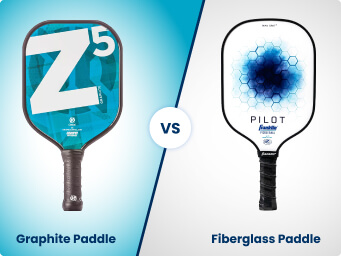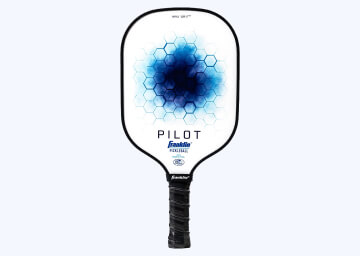
Graphite vs Fiberglass Pickleball Paddles

Are you looking for a new pickleball paddle but don’t know which type to choose? Two of the main materials for pickleball paddles are graphite and fiberglass, and they both have their benefits. In this comparison guide, you’ll learn the similarities and differences between graphite vs. fiberglass pickleball paddles so you can choose the best type for you. Pickleball athlete and Hollywood’s favorite coach, Matt Manasse, also contributed his expertise to this article.
Key Takeaways
- Compare Graphite Paddles to Fiberglass Paddles — Use the chart to compare the control, power, and other differences between graphite and fiberglass paddles.
- Explore Graphite Pickleball Paddles — A lightweight and durable option offering more control for frequent game play.
- Discover Fiberglass Pickleball Paddles — The least expensive option providing power and comfort for beginner players.
- Choose the Perfect Pickleball Paddle — Consider factors like weight, shape, grip size, and how often you want to play before investing in a paddle.
Compare Graphite Paddles to Fiberglass Paddles
The surface material of a pickleball paddle determines the grip, control, and accuracy of each swing. Generally, rougher surfaces like fiberglass provide more spin, while smoother surfaces like graphite offer better consistency. Both graphite and fiberglass paddles offer their advantages, but one may be better for you. Your skill level, how often you play, and what features you want in a paddle will help you make that decision. The following chart helps break down the differences between graphite and fiberglass paddles.
| Comparing Graphite vs Fiberglass Pickleball Paddles | ||
|---|---|---|
| Graphite Paddles | Fiberglass Paddles | |
| Material Composition | Composed of graphite fibers | Mainly composed of composite fiberglass fibers |
| Surface Texture | Smooth surface for better touch and control | Textured surface for better spin and enhanced ball grip |
| Sweet Spot Size | Typically has a larger sweet spot for forgiveness | Smaller sweet spot, requiring more precision |
| Noise Level | Tends to produce a louder, more pronounced sound | Generates a quieter, subdued sound |
| Impact Shock Absorption | Offers less shock absorption than fiberglass | Provides a softer feel with less shock |
| Weight | Usually lighter and thinner | Can be slightly thicker and heavier |
| Weight Distribution | Balanced weight distribution for versatility | Can be end-heavy or evenly balanced |
| Power | Moderate power and pop | Strong power with precise hits giving more pop |
| Control | Offers excellent control and precision | Provides less control than graphite |
| Vibration Dampening | May transmit more vibration to the hand | Better at dampening vibration |
| Price | Tends to be more expensive | Generally more affordable |
“Control and power are influenced by the thickness of the paddle. Typically, a
thicker paddle offers greater absorption and control, whereas a thinner paddle
provides more power. However, weight also plays a crucial role in determining power
and control. Adding lead weight strips to a paddle can alter its total weight,
thereby affecting the power going through the ball. Additionally, the weight of the
paddle can impact maneuverability, either positively or negatively.”
—
Pickleball Expert, Matt Manasse
Explore Graphite Pickleball Paddles
Graphite paddles are made of lightweight and thin carbon material with a crystalline structure. They are stiff, rigid, and have a smooth surface. These paddles offer control, manageability, and strength, but can transfer vibrations during hits. Graphite paddles are long-lasting, but can also be more expensive than fiberglass.

Graphite Paddle Pros
|
Graphite Paddle Cons
|
Who Are Graphite Pickleball Paddles for?
Graphite paddles are very durable, so they’re suitable for avid or professional players who use their paddles frequently. The graphite material can withstand hit after hit, game after game, much better than fiberglass. Graphite paddles can be good for both power players and tactical players but are usually better suited for those who favor control over power.
Discover Fiberglass Pickleball Paddles
Fiberglass is a composite, glass-like material that is created when fibers are compressed under high heat and pressure. It is flexible, responsive, and offers players precise hits. Fiberglass paddles also have textured surfaces that create more spin on the pickleball.

Fiberglass Paddle Pros
|
Fiberglass Paddle Cons
|
Who Are Fiberglass Pickleball Paddles for?
Fiberglass paddles are the most commonly used type among recreational pickleball players because they are a more affordable price and comfortable to hold. They can also be great for power players because of their flexibility and pop. If you are a beginner or intermediate recreational player, fiberglass paddles are a great option. They offer enjoyment and comfortable play without breaking the bank.
"I would recommend every player to use the best paddle they can afford . . . a
beginner player unsure of their longevity in the sport should try the game with a
starter paddle and grow from there."
— Pickleball Expert, Matt Manasse
Choose the Perfect Pickleball Paddle
Once you’ve decided between fiberglass or graphite material, there are a few other factors to consider when choosing a pickleball paddle. These factors can impact your performance and playing style.
-
Weight: The weight of the paddle affects the swing speed and power – lighter paddles have faster swing speed, while heavier paddles offer greater power.
-
Core Material: The core material (polymer, nomex, or aluminum) affects the shock absorption and overall weight of the paddle.
-
Shape: Paddles come in standard, elongated, teardrop, and wide body shapes that impact the swing speed and sweet spot size.
-
Handle Length: The handle helps power your swing, so you need one that is long enough for your desired swing style (one or two hands).
-
Grip Size: The grip size of the paddle influences how well you can hold the paddle – it needs to be properly sized to prevent injuries and performance problems.
Consider these factors to make sure your pickleball paddle provides everything you need. Also, check out our pickleball equipment guide to make sure you come to the court prepared.
"Some people think an advanced paddle will be the difference in leveling up their
game . . . but making sure your technique is right will be the biggest difference
maker."
— Pickleball Expert, Matt Manasse
Have Fun Out There!
Since you are familiar with fiberglass and graphite pickleball paddles, all you have to do now is go shopping. Academy Sports + Outdoors has all the pickleball equipment and accessories you need to get ready to play. Shop online or in store today, then head to the court with your new pickleball paddle!


